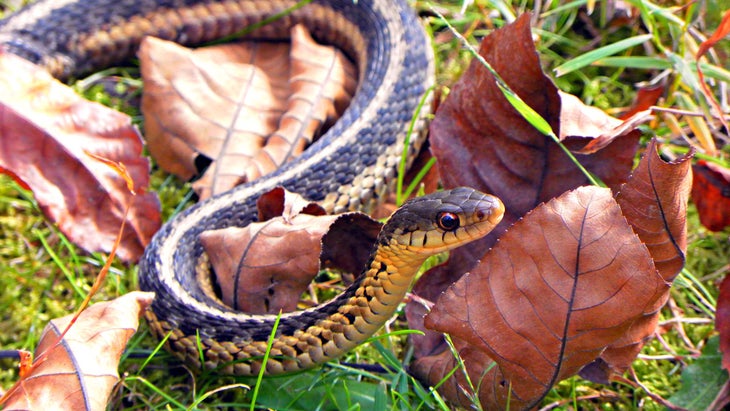Products You May Like
Get full access to Outside Learn, our online education hub featuring in-depth fitness, nutrition, and adventure courses and more than 2,000 instructional videos when you sign up for Outside+
Sign up for Outside+ today.
If you’re one of the many people who’s scared of snakes, a trailside encounter with one of the slithery fellows can set your teeth on edge. Snakes are one of the most common fears in the world, affecting more than 50% of adults in the U.S. by some estimates. It makes sense: A healthy respect for serpents would have served our early hominid ancestors well, especially in the days before modern medicine and antivenins made viper bites reliably survivable. Now, that fear isn’t so rational, but for those with ophidiophobia, just the idea of finding a snake near their campsite can make a backpacking trip a lot less fun.
For the snake avoiders among us, there’s a whole industry of products that purport to keep the legless reptiles away. Spray it around an area, the idea goes, and snakes will keep their distance. But if you’ve been tempted to invest, we have bad news: The only thing it’s going to separate you from is your money. The one thing that all commercial snake repellents have in common is that there’s slim to no evidence they work.
One of the most common solutions, sold under brand names like Snake-a-Way, uses a mix of sulfur and naphthalene—an oil-derived product used as the active ingredient in mothballs. In a 1995 study from the University of Nebraska, researchers tested the chemicals together and separately to see if applying them in residential areas would cause garter snakes to steer clear, and found that they performed no better than a control. Researchers from Israel’s Ministry of Agriculture and Rural Development came to a similar conclusion in 2008 when they found that spraying a naphthalene and sulfur solution on the ground didn’t stop vipers from reaching a caged gerbil; in one case, the researchers even found a snake curled up in a defensive posture on the area they had sprayed.

It’s not necessarily that the snakes can’t sense the chemicals: Thanks to their flickering, forked tongues and sensory apparati in their palates called the vomeronasal organs, snakes actually smell in stereo, sensing odors directionally to make up for their weak vision. But as the researchers in the Nebraska study concluded, they just don’t seem to care enough to avoid it.
“The snakes may be able to sense these volatile chemicals, but the stimuli were unable to alter their behavior,” the study said. “Based on this study, tendency to seek cover, refuge, familiar habitat, or to investigate unfamiliar areas was stronger than deterrence of the chemicals.” Other folk solutions, like circling your sleeping area with a rope, don’t fare any better.
It’s possible that science may still find a safe way to keep hikers and snakes apart: One 2017 paper from Georgia’s Berry College found that Milorganite, a fertilizer produced from the waste stream in Milwaukee’s municipal sewer system, was effective at repelling rat snakes under experimental conditions. Similarly, a 2002 study from the US Department of Agriculture found that essential oils like lavender and cinnamon repelled snakes—when sprayed directly on them. But unless you’re planning on carting refined sludge around in your pack or carrying a spray bottle full of perfume to spritz serpents with like they’re misbehaving housecats, you’re out of luck for now.
So what can nervous hikers do to keep snakes out of their space in the backcountry? First off, don’t attract their prey: Like all predators, snakes follow their food sources. Keep your site clean, store food in rodent-resistant containers, and stop throwing apple cores, banana peels, and other biodegradable-but-edible trash on the ground, and you’ll reduce the number of mice, chipmunks, and other prey species in your campsite.
The best step you can take, however, is to make peace with your slithery neighbors. Snakes play a crucial role in their ecosystems, keeping small animals that could otherwise become nuisances in check, 85-90% of species are non-venomous, and, unless you’ve cornered them or accidentally stepped on them, they’ll always run away from a fight. Work through your fears—either on your own or with the help of a qualified professional—and you might even find yourself with one more thing to appreciate in the wilderness.
